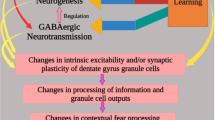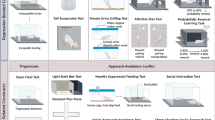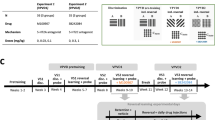Abstract
Rationale
Chronic stress perturbs modulatory brain neurotransmitter systems, including serotonin (5-HT), and is a risk factor for psychiatric disorders such as depression. Deficits in cognitive flexibility, reflecting prefrontal cortical dysfunction, are prominent in such disorders. Orbitofrontal cortex (OFC) has been implicated specifically in reversal learning, a form of cognitive flexibility modulated by 5-HT.
Objectives
The objectives of the study were (1) to assess the effects of chronic intermittent cold (CIC) stress, a potent metabolic stressor, on performance of rats in an attentional set-shifting test (AST), and (2) to assess a possible role for serotonin in CIC-induced deficits and test the effects of acute serotonin reuptake blockade.
Materials and methods
Male Sprague–Dawley rats were exposed to CIC stress (14 days × 6 h/day at 4°C) before testing on the AST. In subsequent experiments, brain 5-HT was depleted in naïve rats with para-chlorophenylalanine or 5-HT release was increased acutely in CIC-stressed rats with citalopram (5 mg/kg, s.c.) given 30 min prior to the first reversal task. Microdialysis was used to assess CIC-induced changes in 5-HT release in OFC during testing.
Results
CIC-stressed rats exhibited a selective impairment on the first reversal task in the AST. 5-HT depletion induced a similarly selective deficit in reversal learning. The CIC-induced impairment in reversal learning was attenuated by acute 5-HT reuptake blockade. 5-HT release was reduced in OFC of CIC-stressed rats during behavioral testing.
Conclusions
The CIC stress-induced impairment of cognitive flexibility may involve dysregulation of 5-HT modulatory function in OFC. Such deficits may thus model relevant symptoms of neuropsychiatric disorders that respond positively to SSRI treatment.




Similar content being viewed by others
References
Ahlers ST, Thomas JR, Berkey DL (1991) Hippocampal and body temperature changes in rats during delayed matching-to-sample performance in a cold environment. Physiol Behav 50:1013–1018
Amat J, Baratta MV, Paul E, Bland ST, Watkins LR, Maier SF (2005) Medial prefrontal cortex determines how stressor controllability affects behavior and dorsal raphe nucleus. Nature Neurosci 8:365–371
Anisman H, Zacharko RM (1986) Behavioral and neurochemical consequences associated with stressors. Ann N Y Acad Sci 467:205–225
Arnsten AFT, Li B-M (2005) Neurobiology of executive functions: catecholamine influences on prefrontal cortical functions. Biol Psychiatry 57:1377–1384
Beck AT (1976) Cognitive therapy and the emotional disorders. International Universities Press, New York
Beck AT (2005) The current state of cognitive therapy: a 40-year retrospective. Arch Gen Psychiatry 62:953–959
Beck AT, Brown G, Steer RA, Eidelson JI, Riskind JH (1987) Differentiating anxiety and depression: a test of the cognitive content-specificity hypothesis. J Abnormal Psychol 96:179–183
Birrell JM, Brown VJ (2000) Medial frontal cortex mediates perceptual attentional set shifting in the rat. J Neurosci 20:4320–4324
Bohn I, Giertler C, Hauber W (2003) Orbital prefrontal cortex and guidance of instrumental behaviour in rats under reversal conditions. Beh Brain Res 143:49–56
Bondi CO, Rodriguez G, Gould GG, Frazer A, Morilak DA (2008) Chronic unpredictable stress induces a cognitive deficit and anxiety-like behavior in rats that is prevented by chronic antidepressant drug treatment. Neuropsychopharmacology 33:320–331
Boulougouris V, Dalley JW, Robbins TW (2007) Effects of orbitofrontal, infralimbic and prelimbic cortical lesions on serial spatial reversal learning in the rat. Beh Brain Res 179:219–228
Boulougouris V, Glennon JC, Robbins TW (2008) Dissociable effects of selective 5-HT2A and 5-HT2C receptor antagonists on serial spatial reversal learning in rats. Neuropsychopharmacology, 33:2007–2019
Brozoski TJ, Brown RM, Rosvold HE, Goldman PS (1979) Cognitive deficit caused by regional depletion of dopamine in prefrontal cortex of rhesus monkey. Science 205:929–932
Channon S (1996) Executive dysfunction in depression: The Wisconsin Card Sorting Test. J Affective Disord 39:107–114
Chudasama Y, Bussey TJ, Muir JL (2001) Effects of selective thalamic and prelimbic cortex lesions on two types of visual discrimination and reversal learning. Eur J Neurosci 14:1009–1020
Chudasama Y, Robbins TW (2003) Dissociable contributions of the orbitofrontal and infralimbic cortex to pavlovian autoshaping and discrimination reversal learning: further evidence for the functional heterogeneity of the rodent frontal cortex. J Neurosci 23:8771–8780
Clarke HF, Dalley JW, Crofts HS, Robbins TW, Roberts AC (2004) Cognitive inflexibility after prefrontal serotonin depletion. Science 304:878–880
Clarke HF, Walker SC, Crofts HS, Dalley JW, Robbins TW, Roberts AC (2005) Prefrontal serotonin depletion affects reversal learning but not attentional set shifting. J Neurosci 25:532–538
Clarke HF, Walker SC, Dalley JW, Robbins TW, Roberts AC (2007) Cognitive inflexibility after prefrontal serotonin depletion is behaviorally and neurochemically specific. Cerebral Cortex 17:18–27
Coleshaw SRK, Van Someren RNM, Wolff AH, Davis HM, Keatinge WR (1983) Impaired memory registration and speed of reasoning caused by low body temperature. J Appl Physiol 55:27–31
Crofts HS, Dalley JW, Collins P, Van Denderen JC, Everitt BJ, Robbins TW, Roberts AC (2001) Differential effects of 6-OHDA lesions of the frontal cortex and caudate nucleus on the ability to acquire an attentional set. Cerebral Cortex 11:1015–1026
Cryan JF, Harkin A, Naughton M, Kelly JP, Leonard BE (2000) Characterization of D-fenfluramine-induced hypothermia: evidence for multiple sites of action. Eur J Pharmacol 390:275–285
Dalley JW, Cardinal RN, Robbins TW (2004) Prefrontal cognitive and executive functions in rodents: neural and neurochemical substrates. Neurosci Biobehav Revs 28:771–784
Dias R, Robbins TW, Roberts AC (1996) Primate analogue of the Wisconsin Card Sorting Test: effects of excitotoxic lesions of the prefrontal cortex of the marmoset. Behav Neurosci 110:872–886
Dias R, Robbins TW, Roberts AC (1997) Dissociable forms of inhibitory control within prefrontal cortex with an analog of the Wisconsin Card Sort Test: restriction to novel situations and independence from “on-line” processing. J Neurosci 17:9285–9297
Dringenberg HC, Hargreaves EL, Baker GB, Cooley RK, Vanderwolf CH (1995) P-chlorophenylalanine-induced serotonin depletion: reduction in exploratory locomotion but no obvious sensory motor deficits. Beh Brain Res 68:229–237
Dunn AJ, File SE (1983) Cold restraint alters dopamine metabolism in frontal cortex, nucleus accumbens and neostriatum. Physiol Behav 31:511–513
Fellows LK, Farah MJ (2003) Ventromedial frontal cortex mediates affective shifting in humans: evidence from reversal learning paradigm. Brain 126:1830–1837
Ferry AT, Lu XC, Price JL (2000) Effects of excitotoxic lesions in the ventral striatopallidal–thalamocortical pathway on odor reversal learning: inability to extinguish an incorrect response. Exp Brain Res 131:320–335
Finlay JM, Zigmond MJ (1997) The effects of stress on central dopaminergic neurons: possible clinical implications. Neurochem Res 22:1387–1394
Fossati P, Amar G, Raoux N, Ergis AM, Allilaire JF (1999) Executive functioning and verbal memory in young patients with unipolar depression and schizophrenia. Psychiatry Res 89:171–187
Goldapple K, Segal Z, Garson C, Lau M, Bieling P, Kennedy S, Mayberg H (2004) Modulation of cortico–limbic pathways in major depression: treatment-specific effects of cognitive behavior therapy. Arch Gen Psychiatry 61:34–41
Gresch PJ, Sved AF, Zigmond MJ, Finlay JM (1994) Stress-induced sensitization of dopamine and norepinephrine efflux in medial prefrontal cortex of the rat. J Neurochem 63:575–583
Hatcher PD, Brown VJ, Tait DS, Bate S, Overend P, Hagan JJ, Jones DNC (2005) 5-HT6 receptor antagonists improve performance in an attentional set shifting task in rats. Psychopharmacology 181:253–259
Herman JP, Ostrander MM, Mueller NK, Figueiredo H (2005) Limbic system mechanisms of stress regulation: hypothalamo–pituitary–adrenocortical axis. Prog Neuro-Psychopharmacol Biol Psychiatry 29:1201–1213
Hornak J, O'Doherty J, Bramham J, Rolls ET, Morris RG, Bullock PR, Polkey CE (2004) Reward-related reversal learning after surgical excisions in orbito-frontal or dorsolateral prefrontal cortex in humans. J Cognitive Neurosci 16:463–478
Idris NF, Repeto P, Neill JC, Large CH (2005) Investigation of the effects of lamotrigmine and clozapine in improving reversal-learning impairments induced by acute phencyclidine and d-amphetamine in the rat. Psychopharmacology (Berl) 179:336–348
Jedema HP, Grace AA (2003) Chronic exposure to cold stress alters electrophysiological properties of locus coeruleus neurons recorded in vitro. Neuropsychopharmacology 28:63–72
Kennedy SH, Evans KR, Kruger S, Mayberg HS, Meyer JH, McCann S, Arifuzzman AI, Houle S, Vaccarino FJ (2001) Changes in regional brain glucose metabolism measured with positron emission tomography after paroxetine treatment of major depression. Am J Psychiatry 158:899–905
Kim J, Ragozzino ME (2005) The involvement of the orbitofrontal cortex in learning under changing task contingencies. Neurobiol Learn Mem 83:125–133
Kornum BR, Licht CL, Weikop P, Knudsen GM, Aznar S (2006) Central serotonergic depletion affects rat brain areas differently: a qualitative and quantitative comparison between different treatment schemes. Neurosci Lett 392:129–132
Lapiz MDS, Bondi CO, Morilak DA (2007) Chronic treatment with desipramine improves cognitive performance of rats in an attentional set shifting test. Neuropsychopharmacology 32:1000–1010
Lapiz MDS, Morilak DA (2006) Noradrenergic modulation of cognitive function in rat medial prefrontal cortex as measured by attentional set shifting capability. Neuroscience 137:1039–1049
Lapiz-Bluhm MD, Soto-Pina A, Morilak DA (2008) Serotonergic involvement in the effects of chronic cold stress on reversal learning in the rats. FASEB J 22:906.4
Lee B, Groman S, London ED, Jentsch JD (2007) Dopamine D2/D3 receptors play a specific role in the reversal of a learned visual discrimination in monkeys. Neuropsychopharmacology 32:2125–2134
Ma S, Morilak DA (2005) Chronic intermittent cold stress sensitizes the HPA response to a novel acute stress by enhancing noradrenergic influence in the rat paraventricular nucleus. J Neuroendocrinol 17:761–769
Mahoney CR, Castellani J, Kramer FM, Young A, Lieberman HR (2007) Tyrosine supplementation mitigates working memory decrements during cold exposure. Physiol Behav 92:575–582
Mana MJ, Grace AA (1997) Chronic cold stress alters the basal and evoked electrophysiological activity of rat locus coeruleus neurons. Neuroscience 81:1055–1064
McAlonan K, Brown VJ (2003) Orbital prefrontal cortex mediates reversal learning and not attentional set shifting in the rat. Behav Brain Res 146:97–103
Morilak DA, Barrera G, Echevarria DJ, Garcia AS, Hernandez A, Ma S, Petre CO (2005) Role of brain norepinephrine in the behavioral response to stress. Prog Neuropsychopharmacol Biol Psychiatr 29:1214–1224
Morilak DA, Lapiz-Bluhm MD (2007) Chronic intermittent cold stress induces impairment in reversal learning in the rat on an attentional set-shifting task. Soc Neurosci Abstr 33, Online: Program number 643.14
Murphy FC, Michael A, Robbins TW, Sahakian BJ (2003) Neuropsychological impairments in patients with major depressive disorder: the effects of feedback on task performance. Psychol Med 33:455–467
Murphy FC, Sahakian BJ, Rubinsztein JS, Michael A, Rogers RD, Robbins TW, Paykel ES (1999) Emotional bias and inhibitory control processes in mania and depression. Psychol Med 29:1307–1321
Murphy FC, Smith KA, Cowen PJ, Robbins TW, Sahakian BJ (2002) The effects of tryptophan depletion on cognitive and affective processing in healthy volunteers. Psychopharmacology (Berl) 163:42–53
Owen AM, Roberts AC, Polkey CE, Sahakian BJ, Robbins TW (1991) Extra-dimensional versus intra-dimensional set shifting performance following frontal lobe excisions, temporal lobe excisions or amygdalohippocampectomy. Neuropsychologia 29:993–1006
Pardon M-C, Ma S, Morilak DA (2003) Chronic cold stress sensitizes brain noradrenergic reactivity and noradrenergic facilitation of the HPA stress response in Wistar Kyoto rats. Brain Res 971:55–65
Patil PG, Apfelbaum JL, Zacny JP (1995) Effects of a cold-water stressor on psychomotor and cognitive functioning in humans. Physiol Behav 58:1281–1286
Paxinos G, Watson C (1998) The rat brain in stereotaxic coordinates, 4th Edition. Academic, New York
Prasko J, Hornacek J, Zalesky R, Kopecek M, Novak T, Paskova B, Skrdlantova L, Belohlavek O, Hoschl C (2004) The change of regional brain metabolism (18FDG PET) in panic disorder during the treatment with cognitive behavioral therapy or antidepressants. Neuro Endocrinol Lett 25:340–348
Ragozzino ME (2002) The effects of dopamine D(1) receptor blockade in the prelimbic-infralimbic areas on behavioral flexibility. Learn Memory 9:18–28
Ragozzino ME, Detrick S, Kesner RP (1999) Involvement of the prelimbic–infralimbic areas of the rodent prefrontal cortex in behavioral flexibility for place and response learning. J Neurosci 19:4585–4594
Rauch TM, Lieberman HR (1980) Tyrosine pretreatment reverses hypothermia-induced behavioral depression. Brain Res Bull 24:147–150
Reinstein DK, Lehnert H, Scott NA, Wurtman RJ (1984) Tyrosine prevents behavioral and neurochemical correlates of an acute stress in rats. Life Sci 34:2225–2231
Riekkinen P Jr., Riekkinen M, Sirviö J, Riekkinen P (1992) Effects of concurrent nicotinic antagonist and PCPA treatments on spatial and passive avoidance learning. Brain Res 575:247–250
Roberts AC, De Salvia MA, Wilkinson LS, Collins P, Muir JL, Everitt BJ, Robbins TW (1994) 6-Hydroxydopamine lesions of the prefrontal cortex in monkeys enhance performance on an analog of the Wisconsin Card Sort test: possible interactions with subcortical dopamine. J Neurosci 14:2531–2544
Roberts AC, Robbins TW, Everitt BJ, Muir JL (1992) A specific form of cognitive rigidity following excitotoxic lesions of the basal forebrain in marmosets. Neuroscience 47:251–264
Rogers RD, Andrews TC, Grasby PM, Brooks DJ, Robbins TW (2000) Contrasting cortical and subcortical activations produced by attentional set shifting and reversal learning in humans. J Cognitive Neurosci 12:142–162
Rogers MA, Kasai K, Koji M, Fukuda R, Iwanami A, Nakagome K, Fukuda M, Kato N (2004) Executive and prefrontal dysfunction in unipolar depression: a review of neuropsychological and imaging evidence. Neurosci Res 50:1–11
Rolls ET, Hornak J, Wade D, McGrath J (1994) Emotion-related learning in patients with social and emotional changes associated with frontal lobe damage. J Neurol Neurosurg Psychiatry 57:1518–1524
Sawchenko PE, Li H-Y, Ericsson A (2000) Circuits and mechanisms governing hypothalamic responses to stress: a tale of two paradigms. Prog Brain Res 122:61–78
Schoenbaum G, Nugent SL, Saddoris MP, Setlow B (2002) Orbitofrontal lesions in rats impair reversal but not acquisition of go, no-go odor discriminations. Neuroreport 7:885–890
Sheline YI (2003) Neuroimaging studies of mood disorder effects on the brain. Biol Psychiatry 54:338–352
Shurtleff D, Thomas JR, Ahlers ST, Schrot J (1993) Tyrosine ameliorates a cold-induced delayed matching-to-sample performance decrement in rats. Psychopharmacology (Berl) 112:228–232
Tait DS, Brown VJ (2008) Lesions of the basal forebrain impair reversal learning but not shifting of attentional set in rats. Beh Brain Res 187:100–108
Thomas JR, Ahlers ST, House JF, Schrot J (1989) Repeated exposure to moderate cold impairs matching-to-sample performance. Aviat Space Environ Med 60:1063–1067
Thomas JR, Ahlers ST, Shurtleff D (1991) Thermal stress modulates temporal patterns of responding on a multiple DRL-FR schedule. Physiol Behav 50:437–442
Tollefson GD (1996) Cognitive function in schizophrenic patients. J Clin Psychiatry 57:31–39
van der Meulen JAJ, Joosten RNJMA, de Bruin JPC, Feenstra MGP (2007) Dopamine and noradrenaline efflux in the medial prefrontal cortex during serial reversals and extinction of instrumental goal-directed behavior. Cerebral Cortex 17:1444–1453
Yeghiayan SK, Luo S, Shukitt-Hale B, Lieberman HR (2001) Tyrosine improves behavioral and neurochemical deficits caused by cold exposure. Physiol Behav 72:311–316
Young AJ, Muza SR, Sawka MN, Gonzalez RR, Pandolf KB (1986) Human thermoregulatory responses to cold air are altered by repeated cold water immersion. J Appl Physiol 60:1542–1548
Acknowledgments
We thank Ms. Julianne Doyen and Ms. Teresa F. Burke for expert technical assistance and also Dr. Dania Rossi for her input and assistance with the microdialysis experiments. The authors have no conflicts of interest to report or any involvement to disclose, financial or otherwise, that may bias the conduct, interpretation, or presentation of this work. All experiments were conducted in compliance with current law in the country in which they were performed.
Support was provided by a Young Investigator Award from NARSAD: The Mental Health Association (to MDSLB), and by research grants from the National Institutes of Health (MH53851 and MH72672 to DAM and MH52369 to JGH).
Author information
Authors and Affiliations
Corresponding author
Rights and permissions
About this article
Cite this article
Lapiz-Bluhm, M.D.S., Soto-Piña, A.E., Hensler, J.G. et al. Chronic intermittent cold stress and serotonin depletion induce deficits of reversal learning in an attentional set-shifting test in rats. Psychopharmacology 202, 329–341 (2009). https://doi.org/10.1007/s00213-008-1224-6
Received:
Accepted:
Published:
Issue Date:
DOI: https://doi.org/10.1007/s00213-008-1224-6




